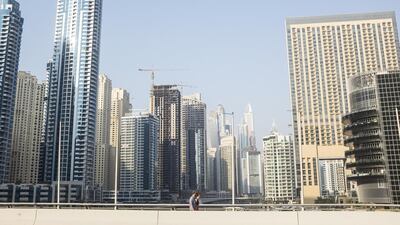The market for residential property in Dubai is now "close to its cyclical trough", but in Abu Dhabi prices and rents may have much further to fall, according to a new report by consultancy JLL.
The firm’s new “2016 Year in Review” report for the UAE property markets argues that the market faced short-term challenges in 2016 as it adjusted to a “new normal” of lower oil revenues, with the rate of growth of GDP dropping from 4.5 per cent in 2015 to just 2.3 per cent last year, and employment growth remaining constant at 1.5 per cent as companies in sectors like banking and oil & gas consolidated staff numbers.
However, it said the medium-term outlook for the UAE economy is much more positive.
“The real estate market in the two largest emirates of Dubai and Abu Dhabi reflect their relative economic strengths,” said Craig Plumb, the head of research at JLL Mena.
He said that Dubai’s more diversified economy, and the fact that prices started to fall in the emirate earlier than Abu Dhabi, meant that it is closer to the bottom of the property cycle than Abu Dhabi, where prices may continue to fall further.
Apartment sale prices in Dubai fell by just 1 per cent year-on-year, JLL said, citing figures provided by Reidin. Villa prices actually increased by 2 per cent. In Abu Dhabi, prices of both apartments and villas fell by 11 per cent year-on-year, while apartment rents dropped by 7 per cent and villa rents by 4 per cent.
The report found that 14,600 new homes were completed in Dubai last year – the highest number since 2012, when 16,000 new homes were delivered. These figures included more than 1,500 villas for Emirates staff in Meydan, over 1,000 new homes at Mira in Emaar Properties’ Reem Community and 1,200 apartments at Meraas Holding’s City Walk project.
There are 35,000 units currently scheduled for completion this year, which would bring the total amount of residential units on the market to 502,000. As in past years, though, JLL said that it expects the actual number to be handed over to be much lower, with deliveries in recent years typically equating to about 35 per cent of forecasted numbers.
In Abu Dhabi, only 3,100 new units were completed, brining the total stock to 248,000. Some 5,000 units are due for completion this year, but as in Dubai, the actual number delivered is likely to be lower as projects are delayed.
In the office market, supply increases in both Dubai and Abu Dhabi were fairly limited, with rents remaining flat in the former and declining by 5 per cent in the latter. The report said the office market in the capital is facing softening demand, because of a fall in demand from oil firms, a reduction in government spending and mergers between major organisations such as Mubadala and Ipic as well as banks NBAD and FGB.
mfahy@thenational.ae
Follow The National's Business section on Twitter


